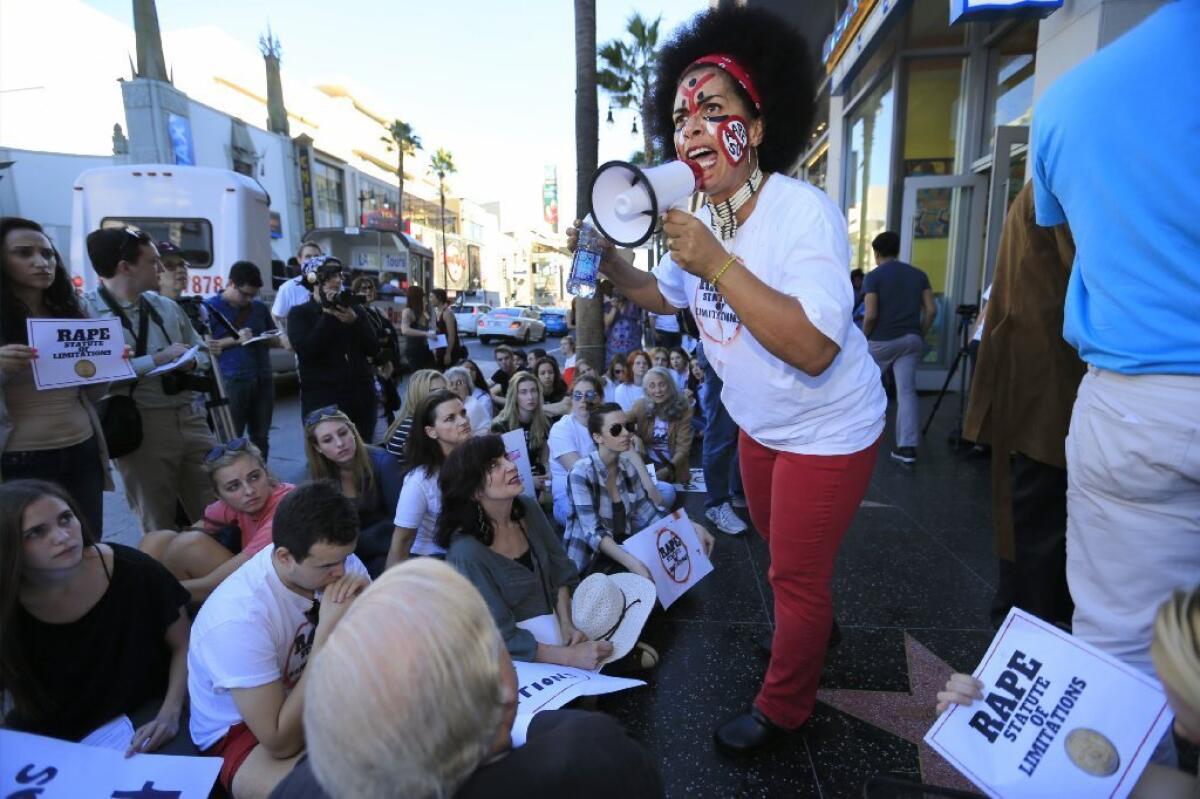After Cosby’s accusers testify, Legislature weighs eliminating statute of limitations for sex crimes

Lili Bernard, who claims Bill Cosby drugged and raped her in the 1990s, speaks at a rally in Hollywood in November in favor of ending California’s statute of limitations for sex crime prosecutions.
- Share via
Reporting from Sacramento — After wrenching testimony that included accounts from three alleged victims of comedian Bill Cosby, a Senate committee on Tuesday gave its first approval to a bill that would allow sex crimes to be prosecuted no matter how long ago they occurred.
The bill, SB 813, from state Sen. Connie Leyva (D-Chino), eliminates the current 10-year statute of limitations on rape cases. Leyva argued in the hearing that giving sexual assault victims more time to report incidents would hold more rapists accountable and provide closure to painful situations.
“A victim should always have the hope that they will be able to have justice,” Leyva said.
See the most-read stories this hour >>
The accusations against Cosby provided a direct example of what the bill seeks to change. In recent years, more than 50 women have accused Cosby of sexually abusing them in incidents that, in some cases, were alleged to have occurred decades ago. District attorneys across the country have cited statutes of limitations as a reason they can’t pursue charges against Cosby, though he does face prosecution in Pennsylvania over an alleged incident in 2004. Cosby has denied all wrongdoing.
Lili Bernard, a Los Angeles actress who appeared on “The Cosby Show,” testified that Cosby mentored her as a father figure before drugging her, suffocating her with a pillow and raping her in the 1990s. Bernard said she went to Atlantic City, N.J., where one of the alleged incidents occurred, with evidence of the crime and was told she had missed the deadline to file charges by a few months.
“War criminals, no matter how many decades have passed, cannot evade prosecution,” Bernard told the Senate committee. “I am asking you to do the same thing for us, rape survivors, who survived the war upon our body.”
See more of our top stories on Facebook >>
Also speaking in favor of the bill were Victoria Valentino, a former Playboy model who alleged Cosby drugged and raped her at an apartment in the Hollywood Hills in 1969; a woman identified before her testimony as “Kacey,” who worked with Cosby and said the actor sexually assaulted her 20 years ago in Bel-Air; and high-profile attorney Gloria Allred, who represents 30 Cosby accusers.
Opponents of the bill said during the 90-minute debate in the Senate Committee on Public Safety that the measure doesn’t address the core problems surrounding rape prosecution. They argued that law enforcement agencies aren’t as aggressive as they could be in going after alleged rapists, citing a recent state audit that found that many existing rape kits hadn’t been tested. The opponents, which included the California Public Defenders Assn. and some victims rights groups, also warned of an increased chance for wrongful convictions, given the length of time that might have passed after an incident.
“When decades pass between prosecution and a criminal offense, memories fade, witnesses die, evidence is lost,” said Natasha Minsker, director of the California chapter of the American Civil Liberties Union. “And it becomes impossible for a person accused of a crime to defend himself or herself.”
California is not the first state to weigh changing its statute of limitations on sexual assaults in the wake of the allegations against Cosby. Last year, Nevada lawmakers increased the statute of limitations for rape prosecutions from four years to 20 years after a Cosby accuser pushed for the change.
NEWSLETTER: Get the best from our political teams delivered daily
Leyva’s bill would not result in Cosby’s prosecution in California for any previous allegations. The bill would only apply to crimes committed after Jan. 1, 2017, or to incidents where the statute of limitations hadn’t run out by that date. The bill now moves to the Senate Appropriations Committee.
Follow @dillonliam on Twitter
ALSO
Bill Cosby protesters demand changes in rape laws
Timeline Bill Cosby: A 50-year chronicle of accusations and accomplishments
More to Read
Get the L.A. Times Politics newsletter
Deeply reported insights into legislation, politics and policy from Sacramento, Washington and beyond. In your inbox twice per week.
You may occasionally receive promotional content from the Los Angeles Times.









